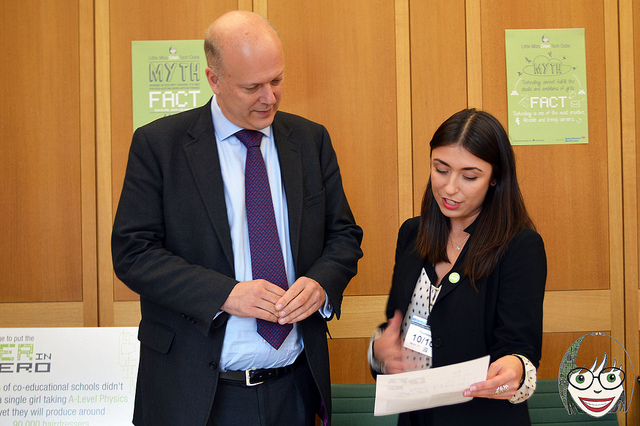The Government’s rehabilitation policy is in crisis due to the Justice Secretary’s ready embrace of austerity
Government rehabilitation policy is in crisis, with the Justice Secretary and Lord Chancellor Chris Grayling presiding over a series of monumental policy errors which have combined to erode prisoner rights and derail the “Rehabilitation Revolution” promised by his predecessor Ken Clarke, according to Richard Ridyard. He argues that Grayling’s devotion and justification of the Government’s austerity policies are the root cause of the crises, and calls for their reversal.

Credit: LadyGeekTV, CC BY ND 2.0
Sharing his party’s penchant for crisis discovery (see, the cost of living crisis, and the London housing crisis) Labour’s Sadiq Khan recently warned of a growing crisis in British prisons. His point is well taken. The degeneration of the prison system, however, has been slow to register with the coalition government. In an earlier statement, justice secretary Chris Grayling downplayed concerns raised about overcrowding in prisons – a response that did little to stop the mounting pressure on resources in its chortling tracks. Belatedly, action was taken. With a poverty of imagination, the government, it emerged, instructed forty prisons in England and Wales to increase their ‘operational capacity,’ despite all but six of these being overcrowded or running at full capacity. This came with a promise of 2,000 extra prison places next year. In the interim, an element of making do until these places materialise is plain to see.
Grayling’s protestations disclose a determined ignorance of an undignified reality. Prison overcrowding – as figures obtained by the Howard League for Penal Reforms magnify – precedes this latest indictment. On average, during the financial year 2012-13, 19,140 prisoners were forced to share a cell designed for one person.
In addition, the latest Ministry of Justice statistics bulletin charts an increase in the number of assaults by prisoners, rising from 14,083 in 2012-13 to 15,033 in 2013-14. When confronted with the figures the justice secretary entered combat stance, boasting of a reduction in prison violence over a five-year period. Using this five-year determinant of success, the number of assaults described as serious provides less comfort for the crisis denier. At 1,699, the 2013-14 figure is markedly higher than 2008-09’s 1,443.
Matters aren’t helped by staff shortages. The issue – closely and scathingly reported by the Howard League for Penal Reform – bears the coalition government hallmark. Prison officer numbers have been cut by 30% over three years, from 27,650 in September 2010 to 19,325 in September 2013 – a decision stained with embarrassment and regret. On the current levels of staffing, Grayling commented more trembly. He admitted to staff shortages in certain prisons but insisted staff are being recruited, without a promise about how many.
Maneuvering towards a more punishment-orientated regime has brought in political returns with fellow punishment enthusiasts. ‘I make no apology that we are sending more criminals to prison – that’s what the public want’, remarked Grayling. This prompts an important question, what room is there for the meaningful rehabilitation promised? An explosive rise in prison suicides suggests very little. In the year to May 91 prisoners killed themselves – a nine year high – up from 60 in the 12 months to December 2012. The number of incidents relating to self-harm is also moving roofwards. Since January it has reached 23,478 this year – an increase of 750 since 2012-13.
The ignition is attributable to prisons budget butchery – a line greatly assisted by chief inspector of prisons Nick Hardwick’s intervention. ‘If you put together the lack of staffing levels, the overcrowding, the lack of activity,’ said Hardwick ‘then I don’t think it is credible to deny that those are contributory factors.’
The faint hope might have been a break in the wave of austerity. To any such tender expectations Grayling offers a trenchant riposte: ‘In this current economic climate all public services are required to help ease the burden. We are not exempt from that and have reduced our overall budget by 24%’. Conditions will be allowed to worsen now that the Justice Secretary has given the greenest of lights to further budget dissection which is set to total £2.4bn by 2015-16.
Recent experiences have awakened a suspicion that, for the government, saving money supersedes prisoner rehabilitation. With approximately 15% of the prison system currently privatised there is no dissolving this suspicion. Some might respond to these criticisms of the British prison system by comparing favourably current conditions with the horrors of Gitarama or another prison glinted in brutality. For exceeding this benchmark, we are compelled to be grateful. Jewels such as this stall progress, bringing time to damaging policies.
On closer examination, Grayling’s ode to austerity and punishment appears at risk of impeaching several prisoner rights. Prisoners have the right to be protected from bullying. Casting doubt on the delivery of this right, during a visit to Glen Parva, in Leicestershire, Nick Hardwick found evidence of prisoners running protection rackets by charging rent for cells and using violence to collect debts. The high level of self-harm at the prison was thought to be directly linked to a culture of bullying. Another prisoner right, the right to spend between 30 minutes and an hour outside in the open air each day, is being exhausted, with prisoners sometimes locked up for 23 hours a day. These accompany two legal challenges I circulated in an earlier article concerning the prohibition on sending prisoners books.
The justice secretary sits at the apex of a record of continuing shame. As the prison system wobbles on the brink of crisis the compass for improvement is small, and will remain so, until the dominance of money interests over prisoner rehabilitation is done away with.
—
Note: this piece represents the views of the author and not those of Democratic Audit or the LSE. Please read our comments policy before posting.
—
 Richard Ridyard is a DPhil candidate in law at the University of Oxford, having previously studied there for a BCL. He is also a Humane Studies Fellow.
Richard Ridyard is a DPhil candidate in law at the University of Oxford, having previously studied there for a BCL. He is also a Humane Studies Fellow.





 Democratic Audit's core funding is provided by the Joseph Rowntree Charitable Trust. Additional funding is provided by the London School of Economics.
Democratic Audit's core funding is provided by the Joseph Rowntree Charitable Trust. Additional funding is provided by the London School of Economics.
More @mojgovuk mendacity, and trenchant criticism of #FailedGrayling by Chief Insp of Prisons. #NotListening https://t.co/VtIc74YHEM
‘The Government’s rehabilitation policy is in crisis due to the Justice Secretary’s ready embrace of austerity’ https://t.co/VBrpDjKJmL
The Government’s rehabilitation policy is in crisis due to the Justice Secretary’s ready embrace of austerity https://t.co/eyVRthPSai
UK Govt’s #rehabilitation policy ‘is in crisis due to the Justice Secretary’s ready embrace of #austerity’ https://t.co/l6BStnwrlW #CPC2014
UK Govt’s ‘#rehabilitation policy is in crisis due to the Justice Secretary’s ready embrace of #austerity’ https://t.co/l6BStnwrlW #CPS2014
The Government’s rehabilitation policy is in crisis due to the Justice Secretary’s ready embrace of austerity https://t.co/8CZwDQw9N4